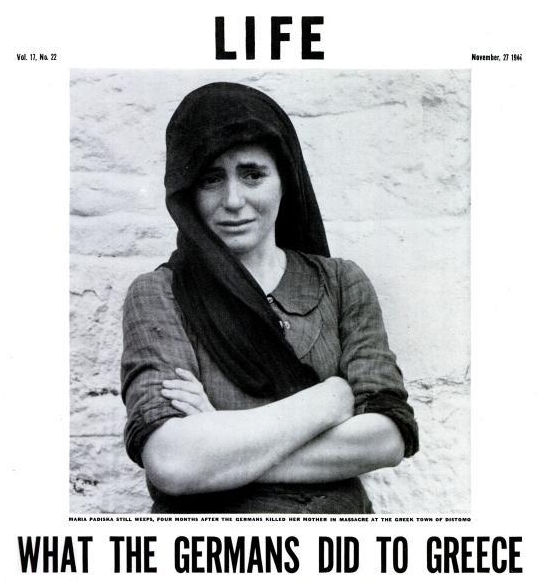Wartime Reparations/Forced Loan Issue Remains Open
German president told wartime reparations/forced loan issue remains open
Karolos Papoulias in calls for talks to resolve outstanding wartime financial claims
Updated At: 19:16 Thursday 6 March 2014President Karolos Papoulias tells his German counterpart, Joachim Gauck, that Greece has never ‘ceded its claims’ over wartime reparations and the repayment of a forced loan from the Bank of Greece to Nazi Germany
Greece has never abandoned its claims for reparations for its occupation by Germany during the second world war or for the repayment of a forced wartime loan, President Karolos Papoulias has told his visiting German counterpart.
Speaking at a joint press conference following his meeting with Joachim Gauck at the presidential mansion, Papoulias said: “I raised the issue of German reparations and the occupation loan with President Gauck. I want to point out that Greece has never ceded its claims and it requests that talks to resolve the issue should commence at the earliest opportunity.”
In reply, Gauck, who is on a three-day visit, said that he could only express the official line of the German government on the matter.
“You know of course that I am a member of the federal government, and you know that I cannot offer any position other than the legal position taken by the German government. I cannot express another opinion. What I can do, however, and I would like to thank you for giving me the opportunity to do so today and tomorrow, when I will accompany you to your native city [in Ioannina] … is to find the right words to express Germany’s guilt for the people and the victims of that region.”
He added that he was honoured to be able to accompany Papoulias, who he described as “a fighter who fought against the barbaric invaders who inflicted so much suffering on the country”.
On Friday, the two heads of state will visit the village of Ligkiades outside Ioannina, the site of a massacre of 92 people by German troops on 3 October 1943, where the German president will lay a wreath.
He will also meet with representatives of Ioannina’s Jewish community. On 25 March 1944, the entire Jewish population, numbering 1,850 men, women and children, were deported to Auschwitz-Birkenau. Only 163 would survive.
Before his meeting with Papoulias, Gauck mentioned that the aim of his visit was to demonstrate solidarity with an historic place. “I would like to confirm the long-standing friendship between the two countries, which may have be overshadowed by recent incidents and discussions, but it still remains strong,” he said.
“I would like to talk with people on a different modern Germany, as the ties beteen the two peoples have a long history. This history yesterday was confirmed at the Acropolis,” the German president said.
“I want you to know, when I was 15, in what was then a communist and dictatorial East Germany, I learnt ancient Greek.”
Source: Enet
WHAT THE GERMANS DID TO GREECE – LIFE magazine 1944
Have you signed the Petition?
As Germans Push Austerity, Greeks Press Nazi-Era Claims

Photo by Angelos Tzortzinis for The New York Times - Giannis Syngelakis at a mass grave in Amiras, Greece, for local men killed by the Nazis.
By SUZANNE DALEY
Published in the NYT: October 5, 2013
“AMIRAS, Greece — As they moved through the isolated villages in this region in 1943, systematically killing men in a reprisal for an attack on a small outpost, German soldiers dragged Giannis Syngelakis’s father from his home here and shot him in the head. Within two days, more than 400 men were dead and the women left behind struggled with the monstrous task of burying so many corpses…”
Read Full article in NYT
Are the Greek Claims for War Reparations Justified?
Posted in HuffingtonPost 17Jun2013
For the last few years the issue of Germany still owing major war reparations to Greece has resurfaced with an increasing intensity. Some of the press reports and some of the comments to related reports question the validity of the Greek claims. This questioning includes:
The claims have been written off by the London Agreement of 1953.
Article 5, paragraph 2, of the London Agreement of 1953 states:
“Consideration of claims arising out of the second World War by countries which were at war or were occupied by Germany during the war, and by nationals of such countries, against the Reich and agencies of the Reich, including costs of German occupation. … shall be deferred until the final settlement of the problem of reparation.”
Thus, the obligation of Germany to pay reparations was not written off by the London Agreement of 1953.
No claims can be made so many years after the end of the war.
Greece has demanded payment of the war reparations, awarded by the Paris Conference of 1946, as well as of a forced occupation loan, in 1945, 1946, 1947, 1964, 1965, 1966, 1974, 1987, and 1995. At the London Conference of 1953, Germany sought and succeeded to defer payments. It was successfully argued that the German government should not have to assume the obligation for the entire debt since it represented only West Germany, and settlement of claims was postponed until Germany would be reunited.
Germany was unified in 1990 with an agreement between Germany, the USSR, Great Britain, the USA and France. On July 23, 1990, the German magazine Der Spiegel wrote that with this Agreement, Germany avoided the nightmare of a peace agreement, which would have brought to the fore demands of reparations from all directions. In other words, with this Agreement Germany sought to circumnavigate article 5, paragraph 2 of the London Agreement.
Today’s Germans cannot be held responsible for reparations.
The demand of Greece for payment has been made continuously from the end of the war up to date, to the generation responsible for the crimes and to their children. It is the Germans that requested and succeeded, with the London Agreement of 1953, to postpone payment of their obligations, and transfer them to their children and grandchildren. These children and grandchildren benefited greatly from the deferral of payments. Germany’s affluence today is greatly due to the fact that Greece and other countries accepted to defer payment of reparations, and to give the opportunity to the Germans that committed the crimes to rebuilt and build a better future for their children, while the Greeks had to build on the ruins left behind by the German war machinery after a brutal and completely unprovoked war.
Reactions of the German government
In an interview to the Greek newspaper Kathimerini (May 12, 2013), the German ambassador to Greece, Wolfgang Dold, said:
“On this subject there is a legal aspect and a moral and political one. Concerning the legal aspect, the essence is that there is no legal base for Greece to claim reparations from Germany. The legal reasons are complex and I would not like to elaborate because of this complexity and because I have to be absolutely accurate… I understand that there are different approaches on the legality of the claims… as Germans we always accepted our moral responsibility for what happened in Greece…. when we go to all these villages whose inhabitants were martyred, we completely understand the magnitude of the sorrow inflicted, because the wounds are still open. On a moral basis, I understand that Greece can claim and Germany can do more to prove that undertakes responsibility of her past…. The official position of the federal government is that there is no difference between the forced occupation loan and the remaining claims for reparations…. As a lawyer I know that there are some legal questions that need to be answered. That is, if the claims have a legal basis, and if they do, whether they have been satisfied, but even if they have not been satisfied, if they can be satisfied although they exist.”
The ambassador claimed that there is no legal base for Greece to claim reparations for reasons that are complex, and he would not like to elaborate, because he could not be absolutely accurate, but he understands that there are different approaches on the legality of the claims. He stated: “as Germans we always accepted our moral responsibility for what happened in Greece.” Acceptance of moral responsibility is not just a rhetorical utterance, or hiding behind legal complexities of an international legal system which in many respects has been designed to protect the powerful. Acceptance of responsibility means that everything possible is done to alleviate the consequences of the crimes.
He understands “that Greece can claim and Germany can do more to prove that undertakes responsibility of her past.” He stated the official position of his government of no differentiation between the forced occupation loan and the claims of reparations, although even Hitler had recognized the obligation of Germany to pay back the loan. As a lawyer he knows “that there are some legal questions that need to be answered.” This contradicts the statement of the German Ministry of Foreign Affairs (April 1, 2012) that “the question of war reparations is no longer an issue,” and that of Mr. Schaeuble, finance minister (April 11, 2013), that “this matter has been resolved long ago,” without saying how. Then he further stated: “but even if they have not been satisfied, if they can be satisfied, although they exist.” How can this be reconciled with his claim and with that of many German officials that Germany always accepted moral responsibility for what happened in Greece? What has been and is asked of Germany is, as a matter of justice, to pay her obligations to Greece, which is within the limits of what can be satisfied, unless acceptance of moral responsibility is just empty rhetoric.

